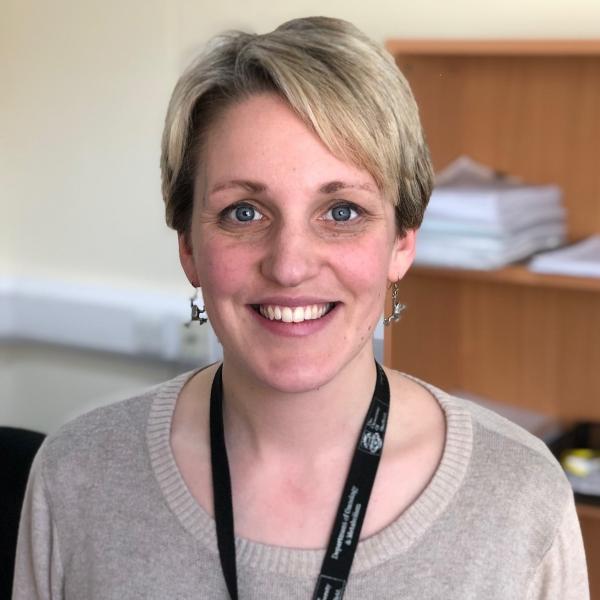Dr Ruth Thompson
School of Medicine and Population Health
Royal Society Dorothy Hodgkin Research Fellow


+44 114 215 9235
Full contact details
School of Medicine and Population Health
GU34
The Medical School
Beech Hill Road
şů«Ӱҵ
S10 2RX
- Profile
-
For enquiries, please contact - iicd-om-operational@sheffield.ac.uk
2018 - present
Royal Society Dorothy Hodgkin Research Fellow
School of Medicieneand Popuoation Health, University of şů«Ӱҵ, şů«Ӱҵ, UK.2016 - 2018
JG Graves Academic Fellow
Unit of Molecular Oncology, University of şů«Ӱҵ, şů«Ӱҵ, UK.
2013 - 2015
Post-doctoral Researcher
Division of Haematology and Medical Oncology, Mount Sinai Hospital, New York, USA.
2010 - 2013
Post-doctoral Researcher
Geisel School of Medicine, Dartmouth College, New Hampshire, USA.
2006 - 2010
PhD
YCR Institute for Cancer Studies, University of şů«Ӱҵ, şů«Ӱҵ, UK.
2003 - 2006
BSc
Genetics, University of şů«Ӱҵ, şů«Ӱҵ, UK.Current PhD Opportunities
- Research interests
-
It is commonly understood that DNA damage is largely sensed and repaired in interphase and it is proposed that DNA repair is largely repressed during mitosis due to the risk of telomere fusion.
Cancer treatments such as chemo and radiotherapy induce massive amounts of DNA damage leading to cell death of rapidly dividing cells. Some cancers have developed resistance to these agents by repairing the damage prior to cell division. For this reason, drugs which target the well-known interphase DNA repair pathways are rapidly being developed for use in the clinic. Drugs such as these could be substantially less effective if there was also a DNA damage checkpoint in mitosis.
The aim of my research is to understand what happens when a cell with damaged DNA arrives in mitosis due to dysfunctional interphase checkpoints. I want to understand which signalling proteins are involved and hope to discover the mechanism by which DNA damage is sensed and targeted for repair in mitosis.Understanding and inhibiting this pathway could lead to sensitization of tumours to standard cancer agents and thus represents a novel site of therapeutic intervention.
- Publications
-
Show: Featured publications All publications
Featured publications
Journal articles
- . Nature Cell Biology, 21(2), 203-213.


- . The Journal of Cell Biology, 216(6), 1795-1810.


- . Molecular & Cellular Oncology, 3(3), e1059921-e1059921.


- . Oncotarget, 7(2), 1380-1394.


- . Molecular Cell, 58(5), 767-779.


- . Cancer Research, 71, 4998-5008.


- . International Journal of Oncology.


- . PLoS ONE, 7(8), e44021-e44021.


All publications
Journal articles
- . International Journal of Molecular Sciences, 25(9).


- . Developmental Cell, 56(15), 2207-2222.e7.


- . Frontiers in Molecular Biosciences, 7.


- . Cells, 8(9).


- . Nature Cell Biology, 21(2), 203-213.


- . British Journal of Hospital Medicine, 78(5), C74-C77.


- . British Journal of Hospital Medicine, 78(5), C78-C80.


- . The Journal of Cell Biology, 216(6), 1795-1810.


- . Molecular & Cellular Oncology, 3(3), e1059921-e1059921.


- . Oncotarget, 7(2), 1380-1394.


- . Molecular Cell, 58(5), 767-779.


- . BMC Cancer, 13(1).


- . British Journal of Clinical Pharmacology, 76(3), 358-369.


- . Cancer Research, 73(8_Supplement), 3413-3413.


- . Cancer Research, 71, 4998-5008.


- . mBio.


- . International Journal of Oncology.


- . PLoS ONE, 7(8), e44021-e44021.


Preprints
- . Nature Cell Biology, 21(2), 203-213.
